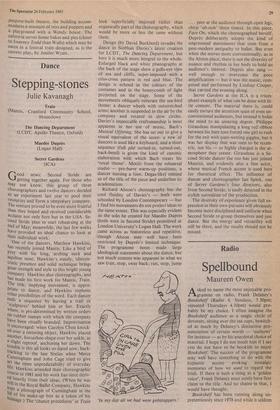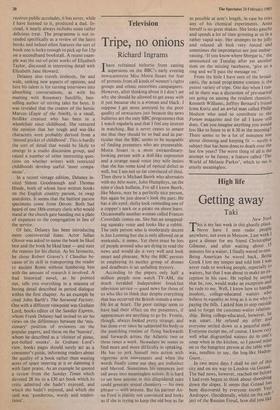Radio
Spellbound
Maureen Owen
Asked to name the most enjoyable pro- gramme on radio, Frank Delaney's Bookshelf (Radio 4, Sundays, 7.30pm; repeated Thursdays 4.10pm) would pro- bably be my choice. I often imagine the Bookshelf audience as a magic circle of devotees, sitting over the tea cups, bewitch- ed as much by Delaney's distinctive pro- nunciation of certain words — `authowe for instance — as by his anecdotal choice of material. I hope I do not insult him if I say you do not have to be bookish to enjoy Bookshelf. The success of the programme may well have something to do with the hypnotic accent evoking nostalgic memories of how we used to regard the Irish. If there is such a thing as a 'golden voice', Frank Delaney must surely have first claim to the title. And no shame in that, I would have thought.
Bookshelf has been running along un- pretentiously since 1978 and while it seldom
receives public accolades, it has never, while I have listened to it, produced a dud. In- stead, it nearly always includes some rather delicious treat. The programme is not in- tended specifically as a review of the latest books and indeed often features the sort of book one is lucky enough to pick up for 15p on a secondhand bookstall. A recent exam- ple was the out-of-print works of Elizabeth Taylor, discussed in interesting detail with Elizabeth Jane Howard.
Delaney also travels tirelessly, far and wide, seeking new aspects of opinion, and here his talent is for turning interviews into absorbing conversations, as with his meeting with Rosemary Sutcliffe, best- selling author of stirring tales for boys. It was revealed that the creator of the heroic Marcus (Eagle of the Ninth), is a small, birdlike creature who has been in a wheelchair since childhood. She ventured the opinion that her tough and war-like characters were probably derived from a 'missed pocket of childhood'. This is hardly the sort of detail that would be likely to emerge in a studio discussion group, and raised a number of other interesting ques- tions on whether writers with restricted childhoods develop useful 'inner compa- nions'.
In a recent vintage edition, Delaney in- vited Simon Goodenough and Thomas Hinde, both of whom have written books on the English country parson, to swap anecdotes. It seems that the battiest parson specimens come from Devon. Both had heard of one 18th-century cleric who would stand at the church gate handing out a plate of sixpences to the congregation in lieu of the service.
Of late, Delaney has been introducing more controversial items. Actor Julian Glover was asked to name the book he liked best and the book he liked least — and state the reasons for his choice. As his favourite, he chose Robert Graves's I Claudius be- cause of its skill in transporting the reader to ancient Rome without lumbering him with the amount of research it involved. A' bad historical novel, as he pointed out, tells you everything in a miasma of boring detail described in period dialogue within the first chapter. As an example he cited John Barth's The Sot wood Factory. One with a different viewpoint was Graham Lord, books editor of the Sunday Express, whom Frank Delaney had invited to air his views on the differences between the 'mis- sionary' position of reviewers on the popular papers, and those on the 'heavies', whom he described as a 'cloister of pious, pot-bellied monks'. In Graham Lord's view, books pages should surely act as a consumer's guide, informing readers about the quality of a book rather than wasting acres of space sneering at it or damning it with faint praise. As an example he quoted a review from the Sunday Times which devoted 28 ins to a £30 art book which.its critic admitted she hadn't enjoyed, and which she hadn't enjoyed, and which she said was 'ponderous, wordy and tenden- tious'.











































 Previous page
Previous page